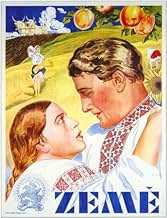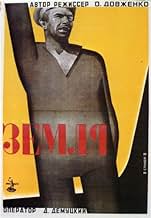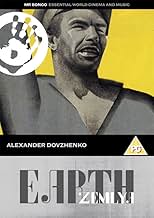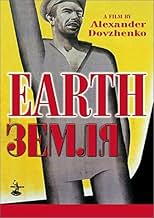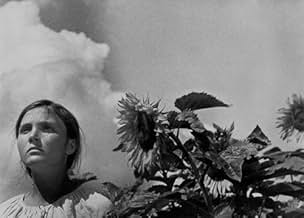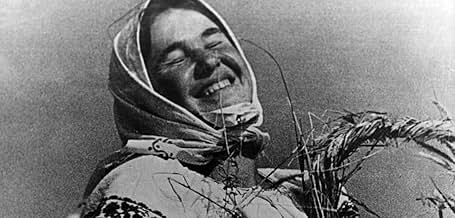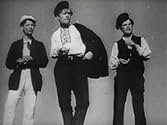IMDb RATING
7.2/10
6.8K
YOUR RATING
In the peaceful countryside, Vassily opposes the rich kulaks over the coming of collective farming.In the peaceful countryside, Vassily opposes the rich kulaks over the coming of collective farming.In the peaceful countryside, Vassily opposes the rich kulaks over the coming of collective farming.
- Director
- Writer
- Stars
- Awards
- 1 win & 1 nomination total
Stepan Shkurat
- Opanas
- (as S. Shkurat)
Semyon Svashenko
- Vasyl - son of Opanas
- (as S. Svashenko)
Yuliya Solntseva
- Daughter of Opanas
- (as Yu. Solntseva)
Yelena Maksimova
- Natalya - Vasyl's fiancee
- (as Ye. Maksimova)
Nikolai Nademsky
- Ded Semyon
- (as N. Nademsky)
Ivan Franko
- Kulak Belokon
- (as I. Franko)
Pyotr Masokha
- Khoma - son of kulak Belokon
- (as P. Masokha)
Vladimir Mikhaylov
- Priest
- (as V. Mikhaylov)
Pavel Petrik
- Young Party-Cell Leader
- (as P. Petrik)
P. Umanets
- Chairman of the Village Soviet
- (as Umanets)
Luka Lyashenko
- Young Kulak
- (as L. Lyashenko)
Vasiliy Krasenko
- Old Peter
- (uncredited)
M. Matsyutsia
- Farm Girl
- (uncredited)
- Director
- Writer
- All cast & crew
- Production, box office & more at IMDbPro
Featured reviews
In Ukraine the landowners hold out against progress and the rights of communally worked farms of the people. When one such farm gets a tractor to further help them one of the richer farmers murders one of the collective, hoping to stop the movement in its tracks. However the opposite is true and the collective rises up out of the oppression and the tragedy to overcome the selfish and cruel approach of the rich.
This is one of those films that I knew I had to see rather than one of those films that are less well regarded but are less demanding to watch. I am glad that I finally got round to it because it is technically and visually a very good film with some very striking images. This is different from it being a good film due to the narrative though because in this regard it is quite a mixed bag. The structure of the tale is not great and it doesn't flow together in a way that I found engaging but more of concern to the modern viewer is the sweeping unquestioning propaganda that the story essentially is. It would be nice to pretend that this does not detract from the film but it does and not because I happen to disagree with the point being made but just because it is the simplistic clumsy point making of propaganda and it does jar slightly.
Dovzhenko's visuals are where the film is strongest though and it is worth seeing for this because whether is the depiction of sorrow or the beauty of the open fields, he catches it really well. If only he had done more with the performances then things would have been helped, not to mention the clunky dialogue cards (although I have to assume that those are mostly down to poor translation). So as long as you are not expecting this to be a fun experience or a great story then it is indeed a classic film that you should watch as part of an education in cinema.
This is one of those films that I knew I had to see rather than one of those films that are less well regarded but are less demanding to watch. I am glad that I finally got round to it because it is technically and visually a very good film with some very striking images. This is different from it being a good film due to the narrative though because in this regard it is quite a mixed bag. The structure of the tale is not great and it doesn't flow together in a way that I found engaging but more of concern to the modern viewer is the sweeping unquestioning propaganda that the story essentially is. It would be nice to pretend that this does not detract from the film but it does and not because I happen to disagree with the point being made but just because it is the simplistic clumsy point making of propaganda and it does jar slightly.
Dovzhenko's visuals are where the film is strongest though and it is worth seeing for this because whether is the depiction of sorrow or the beauty of the open fields, he catches it really well. If only he had done more with the performances then things would have been helped, not to mention the clunky dialogue cards (although I have to assume that those are mostly down to poor translation). So as long as you are not expecting this to be a fun experience or a great story then it is indeed a classic film that you should watch as part of an education in cinema.
The film ends with a stunning panorama of humanity, a set of images alternately showing; a man running mad, a priest beseeching god to punish, a nude woman raving mad, another going into labor, a funeral procession of stern, solemn faces. So it is all there, with life as this dance between sorrow and new life, between damnation and transcendence
It has all been set in motion by the eye though, the Soviet eye that doesn't contemplate but animates by seeing. In Zvenigora it was the statuesque officer of the Red Army as emblematic of Soviet spirit; here it is the young farmer driving a tractor.
So look how it all transpires, it's more knowledge than film courses offer in a year. Before life was clear, content with unjust hardship and small pleasure - images show tilted skies, fields of hay rolling in the wind, and the old man quietly submitting to the prescribed fate - but with the arrival of the tractor, and so this mechanical eye literally plowing through the frame, it's all vigorously animated in a chorus, a frenzy of splintered image. The scenes of production are so powerfully abstract I register them on a cosmologic level; they might as well be a lost reel from the first moments of the universe, in fact, they are, astutely so, about the genesis of a new world and new life from it, Soviet in this case.
In this new life machines are the engines forward. Man as this machine. In something that could read like the ravings of some futurist manifesto, the young man preaches this new word to an assembly of villagers. So even though, like all silent films, it reaches us as a museum piece, we can and must reclaim it; it is a vigorous cinema pounding with the youthful vision of a new society.
Oh, the failings of that society to materialize as prescribed are known to most, and neither here nor there. The thing is this; the struggle was thought to matter, and so this cinema, perfectly centered in that struggle, provided voice that mattered, the song to work the fields to.
Such voice we find in the powerful metaphor that ends the film. There is fruit everywhere, on the ground, or hanging from branches, and it's pouring down hard; it rains and rains but it is all silently endured and what was thought for a moment that would break life away was merely what washed it clean, watered it to grow.
You may hear that Dovzhenko was a Malick of the time who made his art for the masses. Rather it's the other way around; I like Malick, but there is a tinge of sadness compared to a work like this, that his talents - or anyone's for that matter for a long time - cannot hope to animate, and be animated by, a new world anymore and we're merely chronicling our despairs.
It's all so perfectly centered in a worldview, this one probably the final step in the Soviet cinematic sojourn before sound and censors scattered these makers in the four winds. Only the Japanese centered deeper. Oh, it's a sermon alright; but a sermon that washes perception clean.
It has all been set in motion by the eye though, the Soviet eye that doesn't contemplate but animates by seeing. In Zvenigora it was the statuesque officer of the Red Army as emblematic of Soviet spirit; here it is the young farmer driving a tractor.
So look how it all transpires, it's more knowledge than film courses offer in a year. Before life was clear, content with unjust hardship and small pleasure - images show tilted skies, fields of hay rolling in the wind, and the old man quietly submitting to the prescribed fate - but with the arrival of the tractor, and so this mechanical eye literally plowing through the frame, it's all vigorously animated in a chorus, a frenzy of splintered image. The scenes of production are so powerfully abstract I register them on a cosmologic level; they might as well be a lost reel from the first moments of the universe, in fact, they are, astutely so, about the genesis of a new world and new life from it, Soviet in this case.
In this new life machines are the engines forward. Man as this machine. In something that could read like the ravings of some futurist manifesto, the young man preaches this new word to an assembly of villagers. So even though, like all silent films, it reaches us as a museum piece, we can and must reclaim it; it is a vigorous cinema pounding with the youthful vision of a new society.
Oh, the failings of that society to materialize as prescribed are known to most, and neither here nor there. The thing is this; the struggle was thought to matter, and so this cinema, perfectly centered in that struggle, provided voice that mattered, the song to work the fields to.
Such voice we find in the powerful metaphor that ends the film. There is fruit everywhere, on the ground, or hanging from branches, and it's pouring down hard; it rains and rains but it is all silently endured and what was thought for a moment that would break life away was merely what washed it clean, watered it to grow.
You may hear that Dovzhenko was a Malick of the time who made his art for the masses. Rather it's the other way around; I like Malick, but there is a tinge of sadness compared to a work like this, that his talents - or anyone's for that matter for a long time - cannot hope to animate, and be animated by, a new world anymore and we're merely chronicling our despairs.
It's all so perfectly centered in a worldview, this one probably the final step in the Soviet cinematic sojourn before sound and censors scattered these makers in the four winds. Only the Japanese centered deeper. Oh, it's a sermon alright; but a sermon that washes perception clean.
10miloc
From its opening, with an elderly man dying surrounded by impassive adults and obliviously playing children, to its wildly emotional finale, this breathtaking silent work transcends its politics and functions as poetry. It's unmistakeably Soviet -- the messianic fervor of the scene in which the farming community greets the arrival of a tractor would seem like parody if it weren't for Dovzhenko's extraordinary sense of lyricism. Using repeated shots of the expectant farmers crying out "It's coming!" intercut with an empty horizon, he builds the moment so completely that you're excited in spite of yourself; you totally believe in that tractor. (As one of the "rich farmers" says, shellshocked by this threat to their future, "It's a fact. It's here.")
To call the film propaganda, while true, seems rather beside the point. Aren't all films? Dovzhenko's manipulations are certainly no less devious than those of western film. Switch the communist message to a patriotic or even capitalist one, and the setting to the World War II Pacific or the old west or wherever you choose and it's no different than, say, "Shane" or "Gone With the Wind" or "The Passion of the Christ" -- just much, much better.
The story, told in rich montages of motionless figures, fruit, machinery, skies, rippling fields, and above all faces, weaves its "official" message about collective farms and private property with larger themes of religion, the generation gap, and the cycle of life: the Earth that gives life takes it away. A group of children giggle and spy on an old man listening at his friend's grave for a last message; a man sits up on his deathbed to eat a last sweet pear; a serious young radical, alone, gives himself up to a joyful moonlit dance before falling into the dirt. Dovzhenko's approach has less to do with narrative than with creating visual textures; it looks as though Terrence Malick watched this more than a few times before making "Days of Heaven." Dovzhenko's discontinuities and repetitions can be initially bewildering, but they pack a concrete wallop. The images accumulate and crystallize, carrying greater and greater weight, and, as an aging farmer becomes suddenly radicalized by tragedy, the direct shots of his face, hardening in bewilderment and outrage, take on a thunderous power.
To call the film propaganda, while true, seems rather beside the point. Aren't all films? Dovzhenko's manipulations are certainly no less devious than those of western film. Switch the communist message to a patriotic or even capitalist one, and the setting to the World War II Pacific or the old west or wherever you choose and it's no different than, say, "Shane" or "Gone With the Wind" or "The Passion of the Christ" -- just much, much better.
The story, told in rich montages of motionless figures, fruit, machinery, skies, rippling fields, and above all faces, weaves its "official" message about collective farms and private property with larger themes of religion, the generation gap, and the cycle of life: the Earth that gives life takes it away. A group of children giggle and spy on an old man listening at his friend's grave for a last message; a man sits up on his deathbed to eat a last sweet pear; a serious young radical, alone, gives himself up to a joyful moonlit dance before falling into the dirt. Dovzhenko's approach has less to do with narrative than with creating visual textures; it looks as though Terrence Malick watched this more than a few times before making "Days of Heaven." Dovzhenko's discontinuities and repetitions can be initially bewildering, but they pack a concrete wallop. The images accumulate and crystallize, carrying greater and greater weight, and, as an aging farmer becomes suddenly radicalized by tragedy, the direct shots of his face, hardening in bewilderment and outrage, take on a thunderous power.
Like 'The Birth of a Nation' or 'The Triumph of the Will', 'Earth' is a brilliant, groundbreaking film even if morally despicable. And in retrospect of what happened after its release, Stalin's liquidation of millions of Kulaks, its hard not to compare Dovzhenko's Marxism to Reifenstahl's fascism or Griffith's racism. Apologists for all of these filmmakers tell us to 'ignore the story' or 'ignore the propaganda'. Even the Kino DVD introduction instructs us to not take the film literally.
Perhaps instead of asking, 'Can propaganda be art?' the better question is , 'Can art transcend propaganda.' In 'Earth', I think Dovzhenko partially succeeds. The lyrical cycles of birth and death on the Ukrainian steppe are told with visual poetry. In fact, as the film goes on Dovzhenko obviously becomes uninterested in the circumstances of Vasily's murder and martyrdom for the collectivist cause. No doubt, the Soviet regime produced this film to (a) encourage collectivization against private ownership, and (b) Encourage a retro-pagan worship of agrarian life against orthodox Christianity. The collectivist vs. Kulak story in (a) is crude and unconvincing propaganda to a modern audience with historical perspective on Stalin's brutalities in the 1930's. However, it is with the fertile imagery and montage of natural cycles in (b) that Dovzhenko succeeds beautifully and transcends the story and makes it timeless.
Perhaps instead of asking, 'Can propaganda be art?' the better question is , 'Can art transcend propaganda.' In 'Earth', I think Dovzhenko partially succeeds. The lyrical cycles of birth and death on the Ukrainian steppe are told with visual poetry. In fact, as the film goes on Dovzhenko obviously becomes uninterested in the circumstances of Vasily's murder and martyrdom for the collectivist cause. No doubt, the Soviet regime produced this film to (a) encourage collectivization against private ownership, and (b) Encourage a retro-pagan worship of agrarian life against orthodox Christianity. The collectivist vs. Kulak story in (a) is crude and unconvincing propaganda to a modern audience with historical perspective on Stalin's brutalities in the 1930's. However, it is with the fertile imagery and montage of natural cycles in (b) that Dovzhenko succeeds beautifully and transcends the story and makes it timeless.
Dovzhenko was a 'modernist' who drew deepest inspiration from traditional arts. His ode to the beginning of the collectivization is actually an orgy of intoxicant images of bulging clouds, waving wheat fields, ripening fruits and pelting horses.
The arrival of a tractor is hailed by the farmers. They begin to believe that an improved life has started, but Kulaks murder the young leader of the village party committee. This only encourages the village inhabitants in their resoluteness. In a sublime finale sequence, Dovzhenko unites birth, death, harvest, technical progress and solidarity, when the dead are returned to Earth that he loved so much.
No abstract summary can do justice to the extraordinary sensualism of this remarkable film. Whoever searches for the roots of Andrei Tarkovsky's cinema has to start with "Zemlya".
The arrival of a tractor is hailed by the farmers. They begin to believe that an improved life has started, but Kulaks murder the young leader of the village party committee. This only encourages the village inhabitants in their resoluteness. In a sublime finale sequence, Dovzhenko unites birth, death, harvest, technical progress and solidarity, when the dead are returned to Earth that he loved so much.
No abstract summary can do justice to the extraordinary sensualism of this remarkable film. Whoever searches for the roots of Andrei Tarkovsky's cinema has to start with "Zemlya".
Did you know
- TriviaSoviet censors made Aleksandr Dovzhenko eliminate a number of scenes from the film, including the scene of peasants urinating into a tractor radiator, and the scene of nude woman mourning over her dead fiance. The original uncut version was screened in Ukrainian republic when first released, and then in the Museum of Modern Art (New York City, USA) about 40 years later, on 10 October 1969.
- Alternate versionsIn 1997, the film was re-released in Germany by ZDF, with a new score composed by Alexander Popov. This version was digitally improved (known as Arte Edition), then released on DVD and distributed by the absolut MEDIEN GmbH in 2006. The running time is 78 minutes. The crew participants:
- Alexander Popov, Composer;
- Frank Strobel, Conductor;
- Evgeniy Nikulskiy, Sound engineer;
- Nina Goslar, Commissioning editor.
- ConnectionsEdited into Le tombeau d'Alexandre (1993)
- How long is Earth?Powered by Alexa
Details
- Release date
- Country of origin
- Official sites
- Languages
- Also known as
- Zemlja
- Filming locations
- Production companies
- See more company credits at IMDbPro
- Runtime
- 1h 15m(75 min)
- Sound mix
- Aspect ratio
- 1.33 : 1
Contribute to this page
Suggest an edit or add missing content


